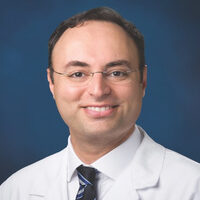Dr. Naseri is board-certified in Otolaryngology-Head and Neck Surgery and the co-director of the North Florida Sinus Center®, based in Jacksonville, Florida. He completed his surgical training in the department of otolaryngology-head & neck surgery at Emory University. He then completed a fellowship at the University of Toronto specializing in Rhinology & Skull Base Surgery, with a focus on open and minimally invasive approaches in the treatment of benign & malignant tumors involving nose/sinuses and the anterior skull base.
He served as full-time faculty at the University of Florida College of Medicine – Jacksonville as an assistant professor with the division of Otolaryngology for five years, and now functions as an adjunct faculty with the University of Florida primarily for teaching, research and surgical collaborations with the department of neurosurgery.
Dr. Naseri’s clinical interests mainly focus on advanced sinus and nasal surgery (often done by a camera and instruments via the nostrils) for removing benign and malignant tumors. These are tumors that often transgress the usual confines of the sinuses and extend into the surrounding adjacent spaces, such as the region of the brain, eyes and may even spread into the lymph nodes in case of some malignancies. Treatment of such conditions involves close collaboration with other subspecialties, particularly with neurosurgeons. Other specialties include radiation oncology, medical oncology, neurovascular surgery, pathology, radiology, and others. Dr. Naseri currently collaborates with neurosurgeons at 4 major hospitals in the region to offer advanced options for surgery in the management of such sinus, nasal, eye, and other tumors in certain parts of the skull even those originating in the brain. He has performed hundreds of surgeries in collaboration with his neurosurgery colleagues, a service which often gets patient referrals from other subspecialty colleagues in ENT and neurosurgery from the greater North Florida region and beyond.
His research projects are ongoing, spanning the following topics: The use and efficacy of Trans-oral Robotic Surgery (TORS) in the treatment of obstructive sleep apnea; The feasibility and role of robotic technologies in anterior skull base surgery; Techniques and outcomes of tracheostomy procedures in a tertiary care hospital environment; Technical considerations, indications and outcomes of endoscopic orbital decompression surgery. His interests in instrument design, engineering, and surgical application has allowed him to offer the latest in cutting-edge technology to allow a tailored surgery that is more complete, efficient and safer.
His career path was guided by inspiration from a few compassionate and dedicated leaders in the field of otolaryngology head and neck surgery. This early stimulus galvanized his direction toward medicine and the subspecialty, and served as motivation to seek further inspiration. By the same token, he recognizes the importance of integration within the local community by volunteerism, education awareness and opportunities to serve as a role model for the younger generation. He is a board member for the Head and Neck Cancer Alliance (HNCA), focused on increasing local efforts such as regional cancer awareness and education, free screenings, and support for patients and families afflicted by cancers involving the head and neck. He serves on multiple hospital committees and is active in resident and medical student education via didactic lectures and clinical instruction. ‘I firmly believe these types of personal investments helps to elevate the person while advancing their local community to a higher level.’
Dr. Naseri has a lifelong commitment to providing and maintaining excellence in his clinical & surgical practice. To do so, he offers care that incorporates the latest in evidence-based research, clinical and surgical concepts and techniques, along with using the state-of-the-art equipment in diagnosing and treating his patients. ‘Each patient must be treated with compassion and adherence to the highest moral and ethical principles. This requires lifelong commitment to learn and educate oneself in an ever-expanding field of knowledge and information.’

